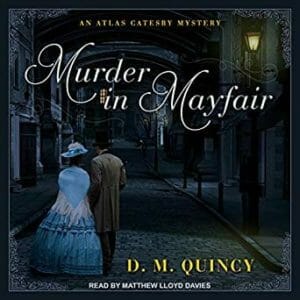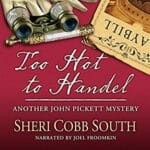 Narrated by Matthew Lloyd Davies
Narrated by Matthew Lloyd Davies
D.M. Quincy’s Murder in Mayfair is the first in a series of Regency Era historical mysteries featuring gentleman traveller, Atlas Catesby. The blurb and some reviewers have suggested it will appeal to fans of Georgette Heyer or of C.S. Harris’ Sebastian St. Cyr novels, but that’s misleading. The writing is solid, but doesn’t possess the wit or sharp observational humour of Heyer – who certainly didn’t pepper her prose with Americanisms – and the plotting doesn’t come close to the complexity of a St. Cyr mystery, not to mention that Atlas Catesby is no Viscount Devlin.
Atlas – the youngest son of a baron – spends most of his time travelling the world, but an injury to his foot has seen him lingering in England for longer than he normally likes, and he’s finding his patience sorely tested. He and his good friend the Earl of Charlton have stopped for refreshment at a country inn when a commotion in the yard draws Atlas’ attention. A jeering crowd surrounds a stocky man and a much younger – and rather striking – woman, and Atlas is outraged to hear the man – identified by the innkeeper as a Mr. Warwick – announce that his wife is for sale to the highest bidder.
Atlas can’t just stand by and do nothing, but the only way he can prevent Mrs. Warwick from being degraded even further is to purchase her himself. So he does, for the princely sum of thirty pounds; explaining that he means her no harm or disrespect and that he will take her to stay with his sister in London while she decides on her next step. Atlas is surprised at her insistence on returning home, and it’s only the next morning that he understands why. The Warwicks have two young boys, aged five and seven, and Mrs. Warwick – Lilliana – wants to try to persuade her husband to allow her to remain with them.
Needless to say, Warwick is not at all amenable to this and sends a distraught Lilliana away, reminding her that she has no rights regarding her children and promising that she’ll never see her sons again.
After settling Lilliana with his sister, Atlas offers to return to Buckinghamshire to meet with Warwick to see if he will be amenable to some sort of financial compensation for allowing Lilliana to visit her sons. But it appears he won’t need to travel so far. Warwick is not the country squire Atlas originally thought him and is actually a tradesman and proprietor of a successful haberdashery on Bond Street. He spends most of his time in London attending to business – and it’s to his shop that Atlas goes in order to attempt to open negotiations on Lilliana’s behalf.
When Warwick proves intransigent, Atlas hints that a few words from him dropped into the right ears could have a seriously deleterious effect on his business – and is rather surprised to discover that the man is not at all worried. His wife has secrets which might be revealed should Atlas attempt such a thing, and he’s confident that’s a risk she won’t want to take.
Temporarily stymied, Atlas has to admit that he doesn’t know much about Lilliana – with whom he is obviously smitten – and that there are things about her story and her marriage to Warwick that don’t add up. A few days later, he returns to Warwick’s shop intending to try again to find a compromise – and discovers Warwick has been killed.
The author sets up her mystery well, firmly establishing Warwick as such a despicable character that there’s no shortage of people with reasons for wanting him dead; and of course, both Atlas and Lilliana are at the top of the list of likely suspects. Frustrated with the slow progress being made by the Bow Street Runner sent to investigate, Atlas decides to make enquiries of his own to clear his name, exonerate Lilliana and find out the truth about Warwick’s murder and, perhaps, get to the bottom of some of the secrets that Lilliana seems determined to keep.
The trouble is that once Warwick is disposed of and there’s no villain to boo and hiss at, the story starts to flag. Atlas and Lilliana are worthy but fairly bland characters, and while their relationship is obviously going to run through several books, they have little to no romantic chemistry, and honestly, I couldn’t see what Atlas saw in Lilliana, or believe his feelings for her were motivated by anything other than his need to protect – he has a saviour complex owing to feelings of guilt about the sister he failed to save from her abusive husband – and compassion for her situation. And Lilliana is hard to warm to; we never get her PoV, and while we’re told she’s dignified and steely-determined, she comes across as aloof and passive, and, in her quest to see her children, does some very stupid things.
The writing is decent but dotted with Americanisms (which sound even more wrong when uttered by a British narrator), and there’s a too-modern feel to some of the characters’ speech and thoughts. I was astonished when Atlas had a discussion about Lilliana’s sexual history with the local magistrate – a virtual stranger – and later talks with Lilliana herself about whether she was a virgin on her wedding night. It’s easier to accept his twenty-first century views on matters such as women’s rights and homosexuality – there must have been some enlightened people around at the time I suppose – than that he would have engaged in such conversations without even the slightest mention of impropriety.
I know I can rely on Matthew Lloyd Davies to deliver an accomplished performance, and it was his name on the cover that prompted me to request a review copy of Murder in Mayfair. In all respects but one, his narration is very good indeed; well-paced and clearly enunciated, his naturally husky baritone is pleasant to listen to and is a good fit for period pieces such as this one. He is as adept at portraying aristocratic characters as he is at voicing those of a lower class, adopting cut-glass tones and an ennui-laden drawl for Charlton and injecting a gravelly note and less polished accents for servants and less well-off characters. The harsh, biting tone he uses to portray Warwick makes him sound suitably unpleasant, and his interpretation of the Bow Street Runner, Endicott, accurately reflects the description of him as a portly man. All that’s to the good, but I can’t deny that I wasn’t completely won over by Mr. Lloyd Davies’ female voices. They’re by no means bad; he doesn’t resort to falsetto and it’s easy to tell the women from the men, but they didn’t quite work for me. His portrayal of Lilliana is generally good – a slight rise in pitch and softening of tone works well here – but sometimes, when he’s speaking as Atlas’ sister, his accent is rather over-exaggerated, and I found it a little jarring.
Murder in Mayfair is a decently written and well-plotted cosy mystery wrapped up in a strong performance from Matthew Lloyd Davies. I’m not sure whether I’ll be continuing with this series, but if you’re fond of cosy mysteries and enjoy historical settings, then you may want to consider checking it out.
Caz
Buy Murder in Mayfair by D.M. Quincy on Amazon




1 thought on “Murder in Mayfair by D.M. Quincy”
Comments are closed.